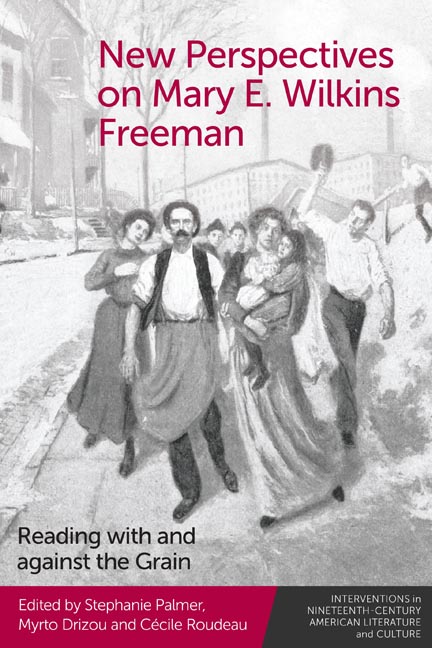Book contents
- Frontmatter
- Contents
- List of Figures
- Acknowledgments
- Contributors
- Reading Freeman Again, Anew
- Part I Kinship Outside of Normative Structures
- Part II Violent, Criminal, and Infanticidal: Freeman’s Odd Women
- Part III Women’s Work: Capital, Business, Labor
- Part IV Periodization Reconsidered
- Afterword: Why Mary E. Wilkins Freeman? Why Now? Where Next?
- Index
12 - A Cacophony of Voices: Freeman’s Modernism
Published online by Cambridge University Press: 20 October 2023
- Frontmatter
- Contents
- List of Figures
- Acknowledgments
- Contributors
- Reading Freeman Again, Anew
- Part I Kinship Outside of Normative Structures
- Part II Violent, Criminal, and Infanticidal: Freeman’s Odd Women
- Part III Women’s Work: Capital, Business, Labor
- Part IV Periodization Reconsidered
- Afterword: Why Mary E. Wilkins Freeman? Why Now? Where Next?
- Index
Summary
A striking painting entitled The Factory Village by J. Alden Weir that hangs in the Metropolitan Museum of Art in New York depicts a cultural moment that inspired many realist authors, even so-called local color writers—the incursion of industrial life into a bucolic rustic landscape. Weir, who had studied in late nineteenth-century France and had the utmost contempt for their Impressionistic painters, returned to America and, ironically, became one of the Impressionistic School of painters in New England. His painting does tend to whitewash the reality of this commercial intrusion, as the factory stands in harmony with the picturesque town and the lovely verdant foliage. The museum label is quite striking in pointing out how Weir “celebrates New England industry—symbols of progress in harmony with Nature.” The description goes further: “A large tree spreads its protective canopy over two telegraphy poles, in the extreme foreground, as well as over the smokestack and spool shop (with tower) of the Willimantic Linen Company’s Connecticut factory.” And as a final note, to undermine the complacency and beauty of Weir’s painting, the museum label concludes that in this “tranquil scene,” there is “no sense or hint of the company’s labor woes or financial problems.”
Just so, in terms of literary criticism of Mary E. Wilkins Freeman, the assessment has been to make her work seem far more peaceful and bucolic than it is, but Freeman is very much aware of the incursion of the industrial into the rural. In the past, many critics, such as Josephine Donovan, have focused on two major turn-of-the-century New England women writers, Mary E. Wilkins Freeman (1852–1930) and Sarah Orne Jewett (1849–1909), as gentle local color writers who wrote nostalgically about rural New England landscapes and who were out of touch with the increasing commercialization of the late nineteenth- century United States. Even Edith Wharton looked down upon them as writing through “rose-colored spectacles.”1 I would like to share another view: both authors were extremely aware of the dangers that modern corporate culture, materialistic strivings, and economic monopolies posed to the individual wanting to live in harmony with nature and with their townspeople.
- Type
- Chapter
- Information
- New Perspectives on Mary E. Wilkins FreemanReading with and against the Grain, pp. 219 - 235Publisher: Edinburgh University PressPrint publication year: 2023



